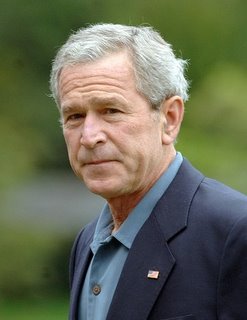

 Yes, it's all as bad as you recall. But if you need a reminder of the timeline, and all of the specific, spastic, and horrific blunders and calculated crimes committed against this country, Sidney Blumenthal was written an excellent piece on Smirking Chimp today.
Yes, it's all as bad as you recall. But if you need a reminder of the timeline, and all of the specific, spastic, and horrific blunders and calculated crimes committed against this country, Sidney Blumenthal was written an excellent piece on Smirking Chimp today.In his 2000 campaign, Bush permitted himself few hints of radicalism. On the contrary he made ready promises of moderation, judiciously offering himself as a "compassionate conservative," an identity carefully crafted to contrast with the discredited Republican radicals of the House of Representatives.... Seeking to distance himself from the congressional Republicans, Bush declared that he was not hostile to government. He would, he said, "change the tone in Washington." He would be more reasonable than the House Republicans and more moral than Clinton. Governor Bush went out of his way to point to his record of bipartisan cooperation with Democrats in Texas, stressing that he would be "a uniter, not a divider."
Trying to remove the suspicion that falls on conservative Republicans, he pledged that he would protect the solvency of Social Security. On foreign policy, he said he would be "humble": "If we're an arrogant nation, they'll view us that way, but if we're a humble nation, they'll respect us.... Arab-Americans are racially profiled in what's called secret evidence. People are stopped, and we got to do something about that...." Bush's intent was to win an endorsement from the American Muslim Council, which was cued to back him after he delivered his debating point, and it was instrumental in his winning an overwhelming share of Muslims' votes, about 90,000 of which were in Florida.The Republicans had control of both houses of the Congress and the presidency for the first time since Dwight Eisenhower was elected.... Immediately upon assuming office, Bush launched upon a series of initiatives that began to undo the bipartisan traditions of internationalism, environmentalism, fiscal discipline, and scientific progress. His first nine months in office were a quick march to the right. The reasons were manifold, ranging from Cheney and Rumsfeld's extraordinary influence, Rove's strategies, the neoconservatives' inordinate sway, and Bush's Southern conservatism. These deeper patterns were initially obscured by the surprising rapidity of Bush's determined tack.
Bush withdrew from the diplomacy with North Korea to control its development and production of nuclear weapons.... Swiftly, Bush rejected the Kyoto treaty to reduce greenhouse gases and global warming, and presented a "voluntary" plan that was supported by no other nation. He also withdrew the U.S. from its historic role as negotiator among Israelis, Palestinians and Arabs, a process to which his father had been particularly committed.
In short order, Bush also reversed his campaign promise to reduce carbon dioxide emissions from power plants and canceled the federal regulation reducing cancer-causing arsenic levels in water....Domestic policy adviser John DiIulio, a political scientist from the University of Pennsylvania, who had accepted his position in the White House on the assumption that he would be working to give substance to the president's rhetoric of "compassionate conservatism," resigned in a state of shock. "There is no precedent in any modern White House for what is going on in this one: a complete lack of a policy apparatus," DiIulio told Esquire magazine. "What you've got is everything - and I mean everything - being run by the political arm. It's the reign of the Mayberry Machiavellis ... Besides the tax cut ... the administration has not done much, either in absolute terms or in comparison to previous administrations at this stage, on domestic policy. There is a virtual absence as yet of any policy accomplishments that might, to a fair-minded non-partisan, count as the flesh on the bones of so-called compassionate conservatism."
By September 10, Bush held the lowest job approval rating of any president to that early point in his tenure. He appeared to be falling into the pattern of presidents who arrived without a popular mandate and lasted only one term. The deadliest foreign attack on American soil transformed his foundering presidency.
 The entire article, and it's encapsulation of the Bush Administration thus far, is well worthy of the time it will take to read. Highly recommended, particularly prior to the November elections, where a majority of votes will be cast in opposition to the recklessness of this Administration, as well as its lack of accountability.
The entire article, and it's encapsulation of the Bush Administration thus far, is well worthy of the time it will take to read. Highly recommended, particularly prior to the November elections, where a majority of votes will be cast in opposition to the recklessness of this Administration, as well as its lack of accountability.
Posted by FleshPresser at 7:05 PM /
![]()
![]()